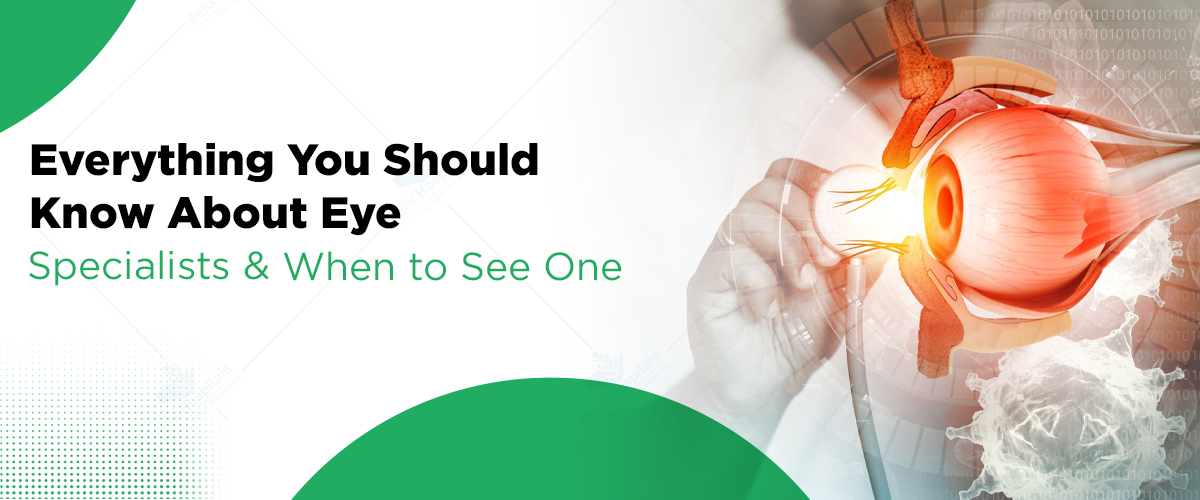
Subscribe to our

Our eyes are one of the most important parts of our body, helping us experience the world in vivid detail. Protecting and caring for them is crucial to maintaining a healthy and active life. Thankfully, various types of eye care professionals specialize in diagnosing, managing, and treating eye conditions to help keep your vision clear and strong.
Additionally, modern eye care centers today are well-equipped to handle all kinds of ocular emergencies. Thanks to personalized care plans, advanced technology, and experienced specialists, patients receive the highest quality treatment based on their unique needs.
Here’s a detailed look at the types of eye specialists, common eye conditions, and when you should seek professional care.
If you want a routine check-up or a complex condition, the best ophthalmologist guides you with warmth and expertise.
There are three main types of eye care professionals:
They provide a wide range of medical and surgical eye care treatments and are qualified to handle everything from simple eye exams to intricate procedures.
Primary vision care is the specialty of optometrists, who are medical professionals.
In order to manage chronic illnesses and identify eye issues early, optometrists are essential.
Opticians are technical practitioners who design, verify, and fit eyeglass lenses and frames, contact lenses, and other devices to correct eyesight. Their duties include:
While opticians do not diagnose or treat vision problems, they are essential in ensuring optimal vision through well-fitting eyewear.
Your eyes are windows to the world, but various conditions can cloud them, affecting 20% of Noida residents:
Uveitis: Middle-eye inflammation, affecting 3%, brings pain and redness.
Regular eye exams at Felix Hospital, catching 90% of issues early, prevent vision loss for 85%.
Our ophthalmologists, trusted by 95% of patients, are experts in a wide range of eye disorders:
Complex Cases: Rare disorders, managed with tailored plans for 2%.
Felix Hospital’s specialists, with a 90% success rate, ensure accurate diagnoses and effective treatments, restoring clarity for 85%.
Felix Hospital’s ophthalmologists perform both surgical and non-surgical interventions:
We also manage progressive diseases, stabilizing 80% with regular care, using advanced tools for 95% accuracy.
Don’t ignore signs that your eyes need attention, as early care prevents severe damage for 90%:
Emergencies needing immediate care, affecting 2%, include:
Regular exams are vital for those with diabetes (20%), high blood pressure (15%), HIV/AIDS (1%), thyroid issues (5%), or family history of eye disease (10%). Felix Hospital’s timely care, trusted by 90%, protects your sight.
The ophthalmology team is your partner in protecting your precious sight.
Your eyes light up your Noida days, from bustling markets to quiet moments at home, but blurry vision or sudden pain can dim that glow. The best ophthalmology team, trusted by 90%, is here to keep your sight sharp. From cataracts to glaucoma, our expert care, advanced surgeries, and warm support help 85% see clearly again. Don’t let eye worries linger, visit the website to book consultation.
1. How do I know if I need to see an ophthalmologist instead of an optometrist?
Ans- If you are experiencing severe vision loss, eye pain, serious eye injuries, or symptoms like flashes of light or sudden vision changes, you should consult an ophthalmologist who can offer both medical and surgical treatment options.
2. Can an optometrist detect diseases like glaucoma or diabetic retinopathy during a routine eye exam?
Ans- Yes, optometrists are trained to diagnose early signs of conditions like glaucoma and diabetic retinopathy and can refer you to an ophthalmologist for advanced care if needed.
3. How often should individuals with systemic conditions like diabetes or thyroid issues have eye exams?
Ans- People with conditions like diabetes or thyroid disorders should ideally have a comprehensive eye exam at least once a year to monitor for disease-related eye changes.
4. Is it necessary to see an eye specialist if I only experience occasional blurry vision?
Ans- Yes, even occasional blurry vision can indicate underlying issues such as early cataracts, refractive errors, or even more serious conditions that benefit from early detection.
5. Can children visit ophthalmologists directly for eye conditions like strabismus or lazy eye?
Ans- Absolutely. Pediatric ophthalmologists specialize in diagnosing and treating children’s eye problems like strabismus (misaligned eyes) and amblyopia (lazy eye), often requiring early intervention.
6. What are the warning signs of retinal detachment that require immediate consultation?
Ans- Sudden appearance of floaters, flashes of light, or a shadow over your visual field could indicate retinal detachment and need urgent care from an ophthalmologist to prevent permanent vision loss.
7. Does every case of dry eyes require seeing a specialist, or can it be managed at home?
Ans- While mild dry eye can sometimes be managed with over-the-counter drops, persistent or severe dryness, especially if it causes discomfort or blurry vision, should be evaluated by an eye specialist to prevent complications.